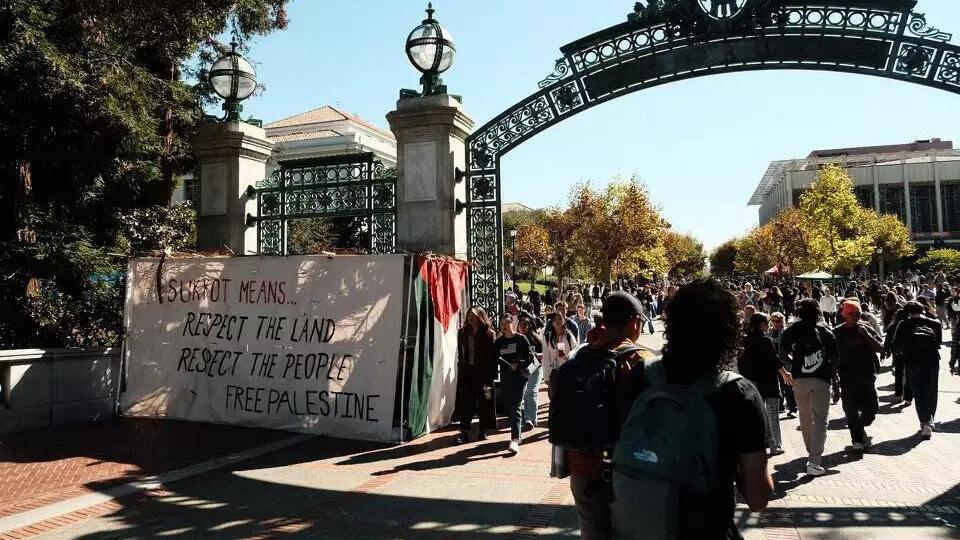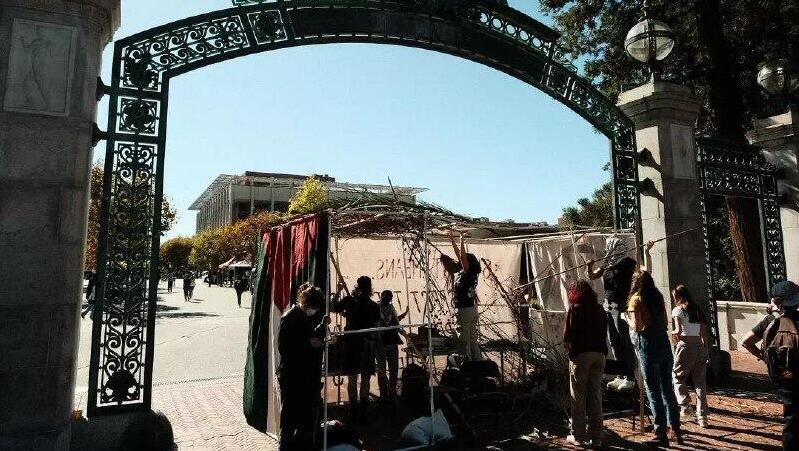Getting your Trinity Audio player ready...
UC Berkeley and Northwestern removed sukkahs set up on their campuses by the anti-Zionist group Jewish Voice for Peace (JVP) and initiated disciplinary actions against the students who erected them.
The sukkahs were dedicated to shows of solidarity with Gaza and calls for a U.S. arms embargo on Israel. The organization, which has been behind many pro-Palestinian demonstrations on campuses since and before October 7, accused the academic institutions of antisemitism after the sukkahs were taken down, claiming the move constituted an infringement on religious freedom.
The universities, in turn, said the sukkahs violated new regulations concerning the setup of temporary structures without permission, following protest encampments that have sprawled across U.S. campuses since Hamas attacked southern Israel last year.
At Berkeley, JVP members placed the sukkah at the campus's main entrance and decorated it with signs calling to stop U.S. arms shipments to Israel and calls to "Free Palestine." The structures also contained sleeping bags, intending to sleep there for several days — as is customary during the holiday.
According to the university, regulations prohibit the establishment of temporary structures on campus grounds without permission, as well as sleeping in buildings not intended for residence. Less than an hour after the sukkah was set up, university representatives arrived and requested its removal. Campus security returned to the site and tore down the structure over the weekend.
JVP argued the move constituted a violation of their right to religious freedom, as they don’t feel safe celebrating the Sukkot holiday at Jewish centers on campus, such as Hillel and Chabad, due to a sense of hostility from pro-Israeli students.
At Northwestern University, JVP members also set up a sukkah dedicated to supporting the Palestinians. The university rejected their request to erect the sukkah, claiming that the group wasn't officially registered with the university and that the structure violated campus regulations. As at Berkeley, the university removed the sukkah after students refused to dismantle it themselves.
The organization claimed that the removal of the sukkah reflected an antisemitic policy, arguing it was a Jewish religious symbol and that the universities prevented students from observing the Sukkot holiday according to Jewish tradition.
“This reveals that Northwestern’s claims of caring for Jewish students were really only about punishing any students who speak out for Palestinian freedom. Because we dedicated our Sukkot to the people of Gaza who are currently enduring genocide, Northwestern decided to send in police to harass us,” Isabel Butera, a representative of the group, said.
"The university has spent the last year weaponizing its purported protection of Jewish students to demonize the movement for Palestinian liberation, but when we seek to observe our religion they destroy our ritual space in the name of ‘fighting antisemitism,'” the organization said in a statement.
Riots against Jewish UC Berkley student group
“Northwestern forced us to repeatedly witness the violent removal of our sacred structure during the High Holy Days. Northwestern has begun disciplinary preceding threatening consequences, including suspension, for Jewish students for not complying with university requests to tear down their own sukkah themselves. Northwestern demonstrated without a shadow of a doubt that they are willing to commit hate crimes against Jewish students in their aim to suppress any form of Palestinian solidarity,” it added.
University representatives defended the restrictions, claiming that the regulations were aimed at maintaining public order on campus and applied uniformly to all students, regardless of religious or national affiliation. They emphasized the rules were not targeting any specific group.
Get the Ynetnews app on your smartphone:







